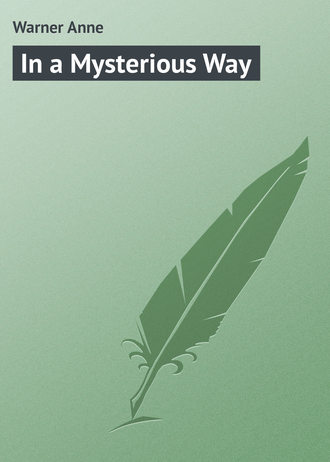 полная версия
полная версияIn a Mysterious Way
"Oh, Ronald," she said, looking into his look, "if you had any idea how fearfully stupid they seem to me. Often and often in the last three years. Even yourself. And ten years ago, when we were eighteen and twenty-five, I thought you so interesting, too."
He burst out laughing at that, – it wasn't in him to take her seriously enough to really mind her "ways" long.
"But what are we to do, when we are such mere ordinary creatures? And you know, my dear, that if the transcendentals like to muse on bridges by moonlight, some well-educated, commonplace individuals must build them the bridges first."
"Ah, there you go again. Yes, that's true. One should never forget that, of course. Particularly when talking with a man who uses a man's logic."
Then she opened the door, passed quickly into the hall, and let it close after her.
A lantern was resting on the floor outside, as if in waiting, and she picked it up and went at once into the night – a dark night through which the station lights and signals, red and yellow, sparkled brightly.
It was a brisk October air that filled that outer world, and the superabundant vitality of God's country came glinting, storming, down, up, and across earth, sky, and ether in between.
"This glorious night!" she thought prayerfully. "If one might only realize just all it means to be existing right now." She held the lantern behind her, and saw her shadow spread forth into space and fade away beyond. "The train isn't in the block yet," she thought, glancing at the signal; "that means minutes long to wait." Quickly she ran down the cinder-path beside the tracks, and entered the little station where a crowd of men lounged.
"Is the train on time to-night?" she asked one.
He shook his head. "Half an hour late," he said; "wreck on the road. Wheel off a car of thrashing-machines at Kent's."
"A whole half hour?"
"Well, I heard Joey Beall say they was making it up," said the man; "the station agent's gone home to supper, or you could ask him."
"Thank you very much," Alva said, and turned and went out.
The night appeared even fairer than before. Her eyes roamed widely. She thought for a minute of going back to the hotel and bidding Ingram come out with her, but then her own mood cried for relief from the labor of his companionship. We do not give our spirits credit for what they learn through adapting themselves to uncongenial companionship. Alva felt hers craved a rest. "I'll go out on the bridge and wait there," she told herself; "that will be the right thing, – to stand above the gorge and say my evening prayers."
So, stepping carefully over the switch impedimenta, she walked on, following the embankment that led out to the Long Bridge.
It is very long – that Long Bridge – and very high as well. I believe that the first bridge, the wooden one, was close to a world's wonder in its days. Even now the skilfully combined network of iron, steel, joist and cable seems a species of marvel, as it springs across the great cleft that the glacier sawed through several million layers of Devonian stratum several million years ago. I forget how many tons of metal went into its structure, but so intricate and delicately poised is the whole, that while trains roar forth upon its length and find no danger, yet does it echo quick and responsive to the light step of a lithe treading woman or even of the littlest child. On this night Alva, wrapped close in her cape, fared fearlessly out into the black beyond. The high braces and beams creaked all along its vanishing length, and she smiled at the sound. "I wonder if sometime, years from now, I shall return and walk out here again, and find the bridge crying me a welcome!" she thought; "I wonder!" A narrow, boarded way led to the right of the rails, and she was soon directly over the gorge. It was far too dark to see the ribbon of river hundreds and hundreds of feet below, or the steep picture-crevasse that encased the water's way. Beyond and below, to the left, she could have seen the windows of Ledgeville, had she turned that way, but she did not do so. It was the gorge that always claimed her, whether by day or by night, and now she leaned upon the steel guard and stared below. "I can see it plainly, even in the dark," she murmured to herself. "I can see every rock and eddy down there, the great curve of whirlpool, and the place where the water slides so smoothly off and then goes mad and foams below. It is all distinct to me. I remember the day that I first saw it, years ago, when – right here, where I stand to-night – he came to me for the first time, and we knew one another directly. And I shall see it just so plainly in the years to come, when it will never enter into my daily life any more, and yet will be the background of all my living."
She stood there for a long time, wrapped in the depth of her own thoughts. The shadows below seemed to shift and drift in their variations of intensity, and her eyes found rest in their profundity. "It's like drawing water out of a well when one is very thirsty," she said, at last, straightening herself and sighing; "it's unexplainable, but oh, it's so good, – the lesson of darkness and water and trees and sky. How grateful I am to be able to spell out a little in that primer!"
Then she clasped her hands and said a prayer, and as she finished the signal flashed the train's entrance within the block. That meant only two minutes until its arrival, and so she turned herself back at once. The crowd at the station had perceptibly increased and began now to surge forth upon the platform. Mrs. Dunstall was there and Pinkie, and Joey Beall and Mrs. Wiley, and Clay Wright Benton, and old Sammy Adams, and Lucia Cosby.
"Been out on the Bridge, I suppose?" Mrs. Dunstall said pleasantly to Alva.
"Yes; it's lovely to-night," the latter replied.
Every one smiled. They all felt that any one who would go out on the bridge on a pitch black night must be mildly insane, but they looked upon Alva as mildly insane anyhow. Mrs. Ray had many beside Ingram to uphold her opinion.
"It's her that bought the old Whittacker house and is putting a bath-tub in it," Joey Beall whispered to a man who was waiting to leave by the last train out.
"I know it," said the man; he was one of those men who never let Joey or anybody else feel that he had any advantage of him, in even the slightest way.
Just then the train charged madly in beside them.
Lassie, out on the Pullman's rear platform, preparatory to climbing down the steep steps the instant that it should be allowable, saw a well-known figure wrapped in a dark cloak, and gave a little cry of joy —
"Alva! Here I am – all safe."
Then she was enwrapped in the same dark cloak herself, for the space of one warm, all-embracing hug, her friend repeating over and over, "I'm so happy to have you – so happy to have you." And then they moved away through the little group of bystanders, and started up the cinder-path towards the hotel.
"I'm so happy to have you!" Alva exclaimed again, when they were alone. She did not even seem to know that she had said so before.
"It was so good of you to ask me! How did you come to think of it? And oh, Alva, what are you doing here, in this lonely place?"
"It will take me all your visit to properly answer those questions, dear; but I'll tell you this much at once. I asked you because I wanted to have you with me, and because I thought that you and I could help one another a great deal right now. And I am here, dear, because I am the happiest woman that the world has ever seen, and because the greatest happiness that the world has ever known is to be here in a few weeks."
Lassie stopped short, astonished.
Alva went on, laughing gaily: "Yes, it is so! Come on, – or you will stumble without my lantern to guide you. I'm going to tell you all about everything when we get alone in our room, but now, little girl, hurry, hurry. Don't stop behind."
So Lassie swallowed her astonishment for the time being, and followed.
The hotel stood on the crest of the hill above the station and the railway's path curved by it. They were there in a minute, and in another minute alone up-stairs in their room – or rather, rooms – for there were two bedrooms, opening one into the other.
"Why, how pretty you have made them," the young girl cried; "pictures, and a real live tea-table. And a work-stand! How cosy and dear! It's just as if you meant to live here always."
Her face glowed, as she absorbed the surprising charm of her new abode. One does not need to be very old or to have travelled very extensively to recognize some comforts as pleasingly surprising in the country.
Alva was hanging up her cloak, and now she came and began to undo the traveller's with a loving touch.
"Why, in one way I do mean to live here always, dear. I never am anywhere that I do not – in a certain sense – live there ever after. People and places never fade out of my life. Wherever I have once been is forever near and dear to me, so dear that I can't bear to remember anybody or anything there as ugly. The difference between a pretty room and an ugly one is only a little money and a few minutes, after all, and I'm beginning to learn to apply the same rule to people. It only takes a little to find something interesting about each. We'll be so happy here, Lassie; how we will talk and sew and drink tea in these two tiny rooms! I've been just feasting on the thought of it every minute since you wrote that you could come."
Lassie hugged her again. "I can't tell you how overjoyed I was to think of coming and having a whole fortnight of you to myself. Every one thought it was droll, my running off like this when I ought to be deep in preparations for my début, but mamma said that the rest and change would do me good. And I was so glad!"
Alva had gone to hang up the second cloak and now she turned, smiling her usual quiet sweet smile as she did so.
"It's a great thing for me to have you, dear; I haven't been lonely, but my life has been so happy here that I have felt selfish over keeping so much rare, sweet, unutterable joy all to myself, – I wanted to share it."
She seated herself on the side of the bed, and held out her hand in invitation, and Lassie accepted the invitation and went and perched beside her.
"Tell me all about it," she said, nestling childishly close; "how long have you been here anyway?"
"A week to-day."
"Only a week! Why, you wrote me a week ago."
"No, dear, six days ago."
"But you spoke as if you had been here ever so long then."
"Did I? It seemed to me that I had been here a long time, I suppose. Time doesn't go with me as regularly as it should, I believe. Some years are days, and the first day here was a year."
"And why are you here, Alva?"
"Oh, that's a long story."
"But tell it me, can't you?"
"Wait till to-morrow, dearest; wait until to-morrow, until you see my house."
"Your house!"
"I've bought a house here, – a dear little old Colonial dwelling hidden behind a high evergreen wall."
"A house here – in Ledge?"
"No, dear, not in Ledge – in Ledgeville. Across the bridge – "
"But when – "
"A week ago – the day I came."
"But why – "
Alva leaned her face down against the bright brown head.
"I wanted a home of my own, Lassie."
"But I thought that you couldn't leave your father and mother?"
"I can't, dear."
"Are they coming here to live?"
"No, dear."
"But I don't understand – "
"But you will to-morrow; I'll tell you everything to-morrow; I'd tell you to-night, only that I promised myself that we would go to a certain dear spot, and sit there alone in the woods while I told you."
"Why in the woods?"
"Ah, Lassie, because I love the woods; I've gotten so fond of woods, you don't know how fond; trees and grass have come to be such friends to me; I'll tell you about it all later. It's all part of the story."
"But why did you come here, Alva, – here of all places, where you don't know any one. For you don't know any one here, do you?"
"I know a man named Ronald Ingram here; he is the chief of the engineering party that is surveying for the dam."
"Is he an old friend?"
"Oh, yes, from my childhood."
Lassie turned quickly, her eyes shining:
"Alva, are you going to marry him?"
Her face was so bright and eager that something veiled the eyes of the other with tears as she answered:
"No, dear; he's nothing but a friend. I was looking for a house – a house in the wilderness – and he sent for me to come and see one here. And I came and saw it and bought it at once; I expect to see it in order in less than a fortnight."
"Then you're going to spend this winter here?"
Alva nodded. "Part of it at any rate."
"Alone?"
Alva shook her head.
Lassie's big eyes grew yet more big. "Do you mean – you don't mean – oh, what do you mean?"
She leaned forward, looking eagerly up into the other's face. "Alva, Alva, it isn't – it can't be – oh, then you are really – "
Two great tears rolled down that other woman's face. She simply bowed her head and said nothing.
Lassie stared speechless for a minute; then – "I'm so glad – so glad," she stammered, "so glad. And you'll tell me all about it to-morrow?"
"Yes, dear," Alva whispered, "I'll tell you all to-morrow. I'll be glad to tell it all to you. The truth is, Lassie, that I thought that I was strong enough to live these days alone, but I learned that I am weaker than I thought. You see how weak I am. I am weeping now, but they are tears of joy, believe me – they are tears of joy; I am the happiest and most blessed woman in the whole wide world. And yet, it is your coming that leads me to weep. I had to have some outlet, dear, some one to whom to speak. And I want to live, Lassie, and be strong, very, very strong – for God."
Lassie sat staring.
"You don't understand, do you?" Alva said to her, with the same smile with which she had put the same question to Ingram.
But Lassie did not answer the question as Ingram had answered it.
"You will teach me and I shall learn to understand," she said.
CHAPTER III
INTRODUCING LASSIE TO MRS. RAY
The next morning dawned gorgeous.
When Lassie, in her little gray kimono, stole gently in to wake her friend, she found Alva already up and dressed, standing at the window, looking out over the October beauty that spread afar before her. It was a wonderful sight, all the trees bright and yet brighter in their autumn gladness, while the grass sparkled green through the dew that had been frost an hour before. The view showed the radiance fading off into the distant blue, where bare brown fields told of the harvest garnered and the ground made ready for another spring.
Lassie pressed Alva's arm as she peeped over her shoulder, and the other turned in silence and kissed her tenderly.
Side by side they looked forth together for some minutes longer, and then Lassie whispered:
"I could hardly get to sleep last night – for thinking of it all, you know. You don't guess how interested I am. I do so want to know everything."
Alva turned to regard her with her calm smile.
"But when you did get to sleep, you slept well, didn't you?" she asked; "tell me that, first of all."
"Why, is it late? Did I sleep too awfully long? Why didn't you call me?"
"Oh, my dear, why? It's barely nine, and that isn't late at all for a girl who spent all yesterday on the train. I let you sleep on purpose. What's the use of waking up before the mail comes? And that isn't in till half-past under the most favorable circumstances; and even then it never is distributed until quarter to ten. I thought we'd get our letters after our breakfast, and then carry them across the bridge with us. Would you like to do that? I have to cross the bridge every morning."
"Cross the bridge? That means to go to your house?"
"Yes, dear."
"How nice! I'm crazy to see your house. Is it far from here to the post-office? Will that be on our way?"
"That is the post-office there – by the trees." Alva pointed to a brown, two-story, cottage-like structure three hundred yards further up the track.
"The little house with the box nailed to the gate-post?"
"It isn't such a little house, Lassie; it's quite a mansion. The lady who lives in it rents the upper part for a flat and takes boarders down-stairs."
"Does she take many?"
Alva laughed. "She told me that she only had a double-bed and a half-bed, so she was limited to eight."
"Oh!"
"I know, my dear, I thought that very same 'Oh' myself; but that's what she said. And that really is as naught compared to the rest of her capabilities."
"What else does she do?"
"I'm afraid I can't remember it all at once, but among other things she runs a farm, raises chickens, takes in sewing, cuts hair, canes chairs and is sexton of the church. She's postmistress, too, and does several little things around town."
Lassie drew back in amazement. "You're joking."
"No, dear, I'm not joking. She's the eighth wonder in the world, in my opinion."
"She must be quite a character."
"Every one's quite a character in the country. Country life develops character. I expect to become a character myself, very soon; indeed I'm not very positive but that I am one already."
"But how does the woman find time to do so much?"
"There is more time in the country than in the city; you'll soon discover that. One gets up and dresses and breakfasts and goes for the mail, and reads the letters and answers them, and then its only quarter past ten, – in the country."
Lassie withdrew from the arm that held her. "It won't be so with me to-day, at all events," she laughed. "What will they think of me if every one here is as prompt as that?"
"It doesn't matter to-day; we'll be prompt ourselves to-morrow. But you'd better run now. I'm in a hurry to get to my house; I'm as silly over that house as a little child with a new toy, – sillier, in fact, for my interest is in ratio with my growth, and I've wanted a home for so long."
"But you've had a home."
"Not of my very ownest own, not such as this will be."
The young girl looked up into her face. "I'm so very curious," she said, with emphasis; "I want so to know the story."
Alva touched her cheek caressingly, "I'll tell you soon," she promised, "after you've seen the house."
Lassie went back into her room and proceeded to make her toilet, which was soon finished.
They went down into the little hotel dining-room then for breakfast, and found it quite deserted, but neat and sweet, and pleasantly odorous of bacon.
"Such a dolls' house of a hotel," said Lassie.
"It's a cozy place," Alva answered. "I like this kind of hotel. It's sweet and informal. If they forget you, you can step to the kitchen and ask for more coffee. I'm tired of the world and the world's conventionality. I told Mrs. Lathbun yesterday that Ledge would spoil me for civilization hereafter. I like to live in out-of-the-way places."
"Mrs. Lathbun is the hostess, I suppose?"
"No, Mrs. O'Neil is the hostess, or rather, she's the host's wife. You must meet her to-day. Such a pretty, brown-eyed, girlish creature, – the last woman in the world to bring into a country hotel. She says herself that when you've been raised with a faucet and a sewer, it's terrible to get used to a cistern and a steep bank. She was born and brought up in Buffalo."
By this time Mary Cody had entered, beaming good morning, and placed the hot bacon and eggs, toast and coffee, before them.
"I'm going for the mail after breakfast, Mary," Alva said; "shall I bring yours?"
"Can't I bring yours?" said Mary Cody. "I can run up there just as well as not." Mary Cody was all smiles at the mere idea.
"No, I'll have to go myself to-day, I think. I'm expecting a registered letter."
"I'll be much obliged then if you will bring mine."
"If there are any for the house, I'll bring them all," Alva said; "will you tell Mrs. Lathbun that?"
"I'll tell her if I see her, but they're both gone. They went out early – off chestnutting, I suppose."
"Oh!"
"Who is Mrs. Lathbun?" Lassie asked, when Mary Cody had gone out of the room.
"I spoke of her before and you asked about her then, didn't you? And I meant to tell you and forgot. She's another boarder, a lady who is here with her daughter. Such nice, plain, simple people. You'll like them both."
"I thought that we were to be here all alone."
"We are, to all intents and purposes. The Lathbuns won't trouble us. They are not intrusive, only interesting when we meet at table or by accident."
"Every one interests you, Alva; but I don't like strangers."
Alva sighed and smiled together.
"I learned to fill my life with interest in people long ago," she said simply; "it's the only way to keep from getting narrow sometimes."
Lassie looked at her earnestly.
"Does every one that you meet interest you really?" she asked.
"I think so; I hope so, anyway."
"Don't you ever find any one dull?"
Alva looked at her with a smile, quickly repressed. "No one is really dull, dear, or else every one is dull; it's all in the view-point. The interest is there if we want it there; or it isn't there, if we so prefer. That's all."
There was a little pause, while the young girl thought this over.
"I suppose that one is happiest in always trying to find the interest," she said then slowly; "but do tell me more about the Lathbuns."
"Presupposing them in the dull catalogue?"
Lassie blushed, "Not necessarily," she said, half confusedly.
Alva laughed at her face, "I don't know so very much about them, except that they interest me. The mother is large and rather common looking, but a very fine musician, and the daughter is a pale, delicate girl with a romance."
Lassie's face lit up: "Oh, a romance! Is it a nice romance? Tell me about it."
"It's rather a wonderful romance in my eyes. I'll tell it all to you sometime, but that was the train that came in just now, and I want to get the mail and go on over to the house, so we'll have to put off the romance for the present, I'm afraid."
"I don't hear the train."
"Maybe not – but it went by."
"Went by! And the mail! How does the mail get off by itself?"
"Oh, my dear, I must leave you to learn about the mail from Mrs. Ray. She'll explain to you all about what happens to the Ledge mail when the train rushes by. It's one of her pet subjects."
"Do you know you're really very clever, Alva; you seem to be plotting to fill me full of curiosity about everything and everybody in this little out-of-the-way corner in the world? Nobody could ever be dull where you are."
A sudden shadow fell over the older's face at that; a wistful wonder crept to her eyes.
"I wish I could believe that," she said.
"But you can, dear. You've always seemed to me to be just like that French woman who was the only one who could amuse the king, even after she'd been his wife for forty years. You'd be like that."
Alva rose, laughing a little sadly. "God grant that it may be so," she said, "there are so many people who need amusing after forty years. But, dear, you know I told you last night that I sent for you to come and teach and learn, and you are teaching already."
"What am I teaching?" Lassie's eyes opened widely.
"You are teaching me what I really am, and that's a lesson that I need very much just now. It would be so very easy to forget what I really am these days. My head is so often dizzy."
"Why, dear? What makes you dizzy?"
"Oh, because the world seems slipping from me so fast. I could so easily quit it altogether. And I must not quit it. I have too much to do. And I am to have a great task left me to perform, perhaps. Oh, Lassie, it's hopeless to tell you anything until I have begun by telling you everything. You'll see then why I want to die, and why I can't."
"Alva!"
"Don't be shocked, dear; you don't know what I mean at all now, but later you will. Come, we must be going. No time to waste to-day."
They went up-stairs for hats and wraps, and then came down ready for the October sunshine. It was fine to step into the crispness and breathe the ozone of its glory. On the big stone cistern cover by the door a fat little girl sat, hugging a cat and swinging her feet so as to kick caressingly the brown and white hound that lay in front of her.








